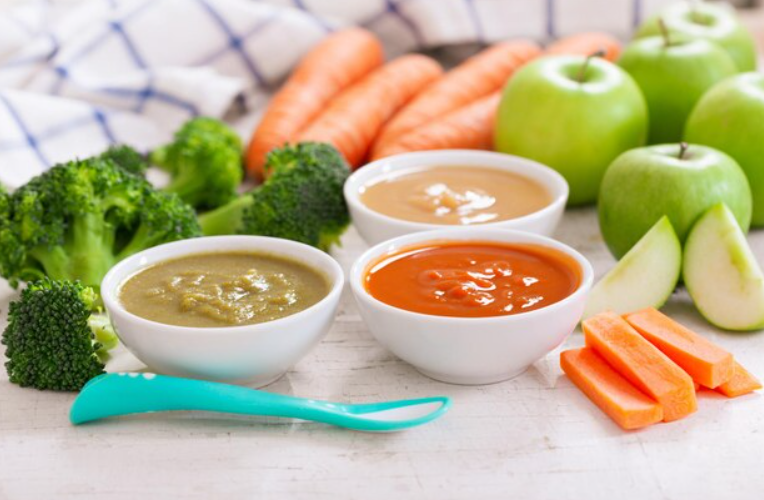Nutritious Organic Baby Food Recipes
Introducing solid organic foods at six months of age is a major developmental milestone for infants. At this stage, babies begin to experiment with new flavours and textures while attending to their growing nutritional needs. Including organic baby food recipes in their diet offers many advantages, especially in terms of health and well-being. Because organic ingredients are grown without harmful pesticides or artificial additives, they protect babies from potentially dangerous chemicals during these crucial early years.
Benefits of Choosing Organic Baby Food
Choosing organic baby food offers benefits beyond reducing chemical exposure. Thanks to their cultivation practices, organic foods often contain more vital nutrients and vitamins than conventionally grown foods. For babies, eating fresh, whole foods is usually healthier and more enjoyable because they retain more natural flavours and nutrients. By offering organic options, parents help their babies form a preference for healthy foods, laying the foundation for future good eating habits.
Promoting Balanced Nutrition for Your Baby
Parents must emphasise a balanced diet tailored to their baby’s needs when introducing solid foods. Organic baby food serves as a nutrient-dense substitute for commercially produced varieties, fitting perfectly within this framework. The variety of available recipes and ingredients enables parents to provide important dietary diversity. By understanding the milestones of this transitional stage, parents ensure that their infants receive the right flavours and textures to encourage ongoing development and food exploration.
Investing in Your Baby’s Health with Organic Food
Choosing organic baby food is an investment in your baby’s health and general well-being. By prioritising organic ingredients, parents make informed decisions that support their child’s development and lay the groundwork for a lifetime of healthy eating.
Key Components of Homemade Infant Food
Making homemade baby food is a wonderful way to introduce your 6-month-old to a range of healthy, natural ingredients. The selection of ingredients is key to ensuring the food is both safe and nourishing for your infant. Fruits, vegetables, grains, and proteins are all essential organic ingredients to include. Opt for premium organic produce, free from chemicals and pesticides, as these can harm your baby’s developing body.
Fruits for Baby Food: Choosing the Right Options
Fruits that are naturally sweet with smooth textures, like organic apples, bananas, and ripe avocados, make excellent choices for young palates. These fruits provide essential vitamins and healthy fats, which are crucial for your baby’s development. Similarly, vegetables that are rich in nutrients, such as sweet potatoes, carrots, and peas, offer great benefits. To prevent choking hazards, ensure vegetables are thoroughly cooked and puréed to a smooth consistency. 
Grains and Proteins for Baby’s Diet
Simple porridge is an excellent way to introduce grains like brown rice or organic muesli. These grains aid your baby’s digestion and are rich in fibre. Proteins are equally important, so include organic lentils or puréed, well-cooked chicken or turkey. These protein sources are essential for growth and development. To preserve the nutritional value of ingredients, freeze homemade baby food in small portions and store them in glass containers. This method allows your baby to enjoy freshly made meals while you prepare healthy dishes in advance.
Choosing the Best Ingredients for Your Baby
In conclusion, when making baby food for a 6-month-old, prioritise organic fruits, vegetables, whole grains, and nutritious proteins. By carefully selecting ingredients and using proper storage methods, you ensure your baby gets the best nutrition for their early development.
Easy and Healthy Recipes for Organic Baby Food
Introducing solid foods to babies is an exciting experience, especially when you focus on organic options that support health and well-being. This section presents easy and healthy recipes specifically designed for six-month-olds, giving parents the opportunity to explore different flavours and textures. Each recipe emphasises the importance of using organic ingredients to ensure that the food is healthy and safe for young children.
Sweet Potato Puree Recipe for Baby
Sweet potato purée is a simple recipe to try. Start by peeling, chopping, and steaming one medium organic sweet potato for 15 to 20 minutes, until it is tender. Once soft, place the sweet potato in a blender and add a little water or breast milk to achieve the desired consistency. Purée until smooth, then serve to introduce your infant to natural sweetness and vital nutrients.
Pear and Avocado Mash: A Delicious Combination
A pear and avocado mash is another healthy recipe choice. Begin by selecting a ripe organic pear, removing the core, and peeling it. Dice half of an avocado and the pear. In a bowl, combine the two ingredients and mash until smooth. This blend not only offers a unique taste combination but also supports brain development by providing healthy fats from the avocado.
Homemade Muesli for a Healthy Start
Muesli is an excellent option for those who enjoy grains. Follow the package instructions to cook organic oats in water or breast milk. Instant oats usually take around 5 minutes to cook. Once cooked, let it cool slightly before serving. You can add pureed fruits, such as apples or bananas, to enhance flavour and nutrition, or blend it for a smoother texture.
Why Organic Recipes Are Essential for Your Baby’s Health
These recipes promote a healthy diet for your baby by encouraging taste exploration and ensuring meals are free from additives and preservatives. The emphasis on organic ingredients helps develop lifelong healthy eating habits. These easy recipes serve as a starting point for building healthy eating habits in infants as you begin introducing solids.
Advice for Making the Switch to Solid Foods
Introducing solid foods to your infant is an exciting milestone, but challenges may arise along the way. It’s crucial to recognise your baby’s hunger cues during this time. Look for signs such as increased appetite, reaching for food on your plate, or opening their mouth to accept food. When these signals occur, your baby is ready to experiment with different food textures and flavours. 
Gradual Introduction of New Foods
When introducing solid foods, it’s important to proceed gradually. Experts recommend introducing new foods one at a time, with a few days between each introduction. This method allows your baby to become accustomed to different flavours while also helping you monitor for any allergic reactions. Organic baby food made with just one ingredient, like pureed sweet potatoes or peas, can help lay the foundation for future meals.
Texture Progression in Baby Food
As your baby begins eating solid foods, think about the progression of food textures. After starting with smooth purees, gradually introduce small, soft pieces and thicker textures. This stage helps develop chewing skills and supports oral development. Equally important is creating a welcoming environment for mealtime. Minimise distractions and allow your baby to explore their food. This exploration makes mealtimes more enjoyable and fosters independence.
Making Meal Planning Easier for Parents
Meal planning can help make the transition to solid foods smoother for working parents. By preparing organic baby food in bulk and freezing it in portion-sized containers, you can save time during the week. Consider including organic baby food in family meals. For example, add pureed vegetables to soups or stews, making it easier to offer nutritious options for the entire family. This method exposes your baby to a variety of flavours and reinforces the importance of healthy eating at home.
